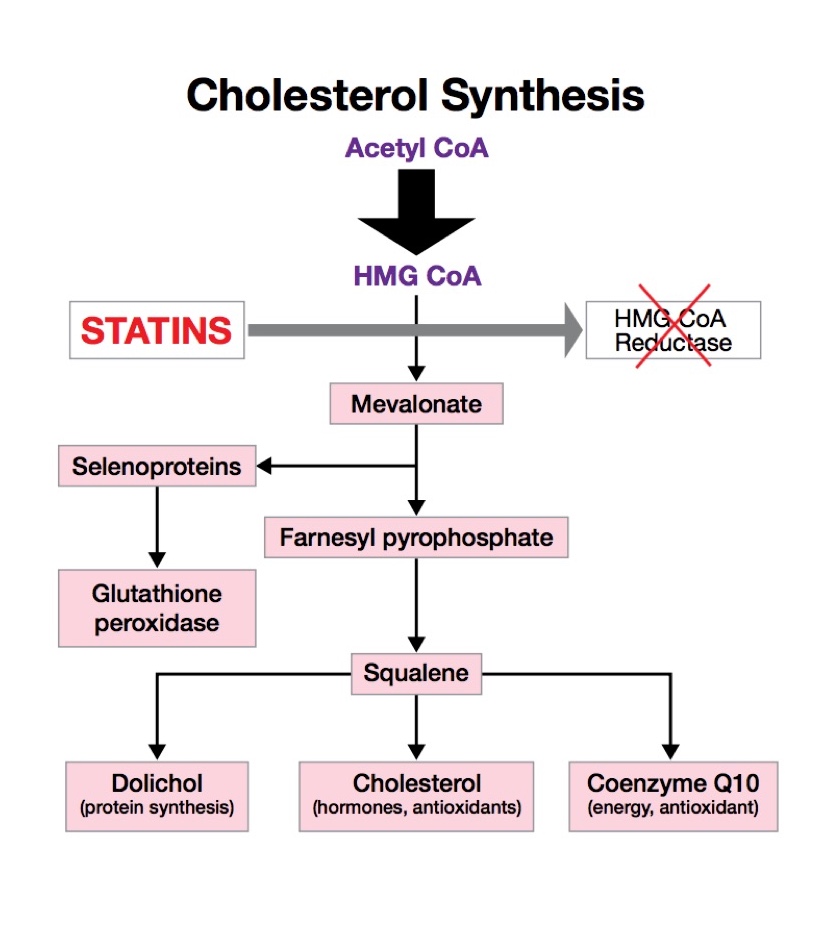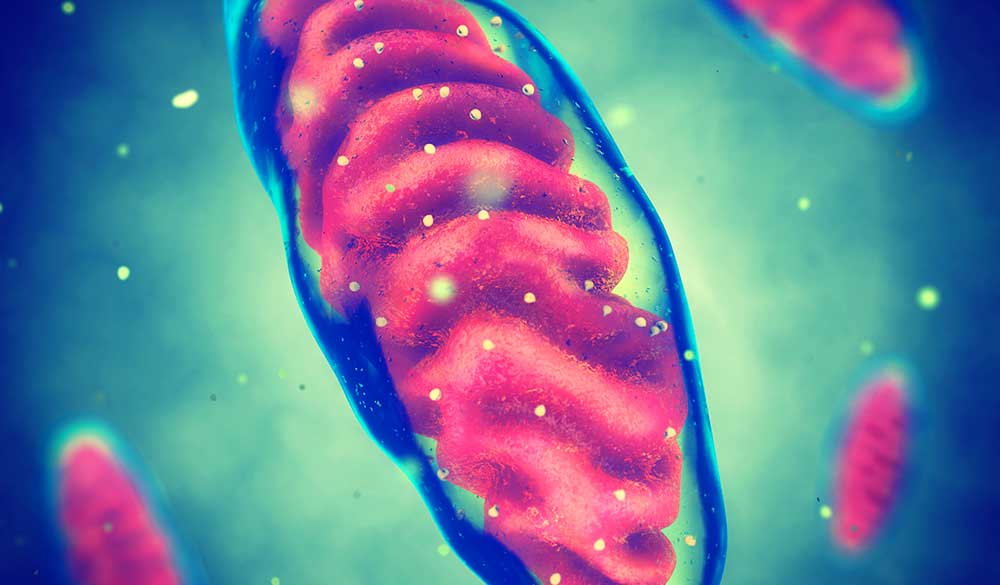The hormone-like substance, coenzyme Q10 (CoQ10) is synthesised by the body and stored in the mitochondria.[1] Deficiency of the active form of CoQ10 can therefore affect the body’s ability to produce energy at the mitochondrial level. It is present in all body cells but is found in highest concentrations in the organs that use the greatest energy; these include the heart, kidneys, lungs and liver.[1] CoQ10 is involved in production of adenosine triphosphate (ATP) which is involved in energy transfer within cells.
CoQ10 comes in two forms – ubiquinol and ubiquinone. Ubiquinone is metabolised to ubiquinol which is the antioxidant form of CoQ10. It is also the most absorbable form and accounts for 90% of the CoQ10 in the blood. Thus, choosing supplements containing the ubiquinol form is recommended.[2,3]
Ubiquinol deficiency may be caused by:
- Low levels of vitamin B6 – endogenous synthesis of the quinone nucleus of CoQ10 from tyrosine requires adequate vitamin B6, thus low levels may result in low ubiquinol levels.[4]
- Inherited genetic mutations, such as that of the APTX gene affecting synthesis and utilisation.[5]
- Oxidative stress due to ageing.[6]
- Production associated with chronic illness – diabetes and cancer have been linked to low levels of ubiquinol as has heart disease.[7] It is not clear whether low levels of ubiquinol cause these diseases or are a result of them.
- A side effect of statin treatment - some cholesterol-lowering medications inhibit the action of HMG-CoA reductase, causing a reduction in the amount of mevalonate available to make cholesterol and also CoQ10. Thus, statins can reduce the concentration of CoQ10 in the bloodstream – both the conventional form and the active form of the compound, ubiquinol. Long-term statin use has been associated with fatigue and muscle cramps.[8]
Ubiquinol is synthesised in a similar way to the production of cholesterol, a vital component of cell membranes. In CoQ10 production, acetoacetyl-CoA is converted into mevalonate by HMG-CoA reductase. Mevalonate can be used to make either cholesterol or CoQ10, and in turn, ubiquinol.[8]

Ubiquinol is an important antioxidant that protects cells from oxidative damage as well as assisting the regeneration of other potent antioxidants such as vitamin E.[9] The antioxidant actions and function as a cofactor for energy production of ubiquinol make it a vital nutrient for cardiovascular health.[10] In a study of 420 people with heart failure, treatment with CoQ10 (100mg three times daily) for two years improved symptoms and reduced their risk of morbidity due to heart problems.[11]
The body can’t store ubiquinol, so regular use is recommended to see its benefits. Supplementing with ubiquinol appears to be well tolerated by individuals and has low toxicity.[12,13]
Foods that provide CoQ10 include organ meats and meat, oily fish, vegetables (spinach, broccoli, cauliflower, avocado), fruit (oranges clementine, persimmon), legumes and wholegrains, soybean and canola oil.
Because it is fat soluble, up to a third of the CoQ10 in vegetables and eggs can be lost during frying; CoQ10 content is not changed when cooked in water.[14]
References:
- Garrido-Maraver J, Cordero MD, Orpesa-Avila M, et al. Coenzyme q10 therapy. Mol Syndromol 2014;5(3-4):187-197. [Full Text]
- Langsjoen PH, Langsjoen AM. Comparison study of plasma coenzyme Q10 levels in healthy subjects supplemented with ubiquinol versus ubiquinone. Clin Pharmacol Drug Dev 2014;3(1):13-7. [Abstract]
- Prangthip P, Kettawan A, Posuwan K, et al. An improvement of oxidative stress in diabetic rats by ubiquinone-10 and ubiquinol-10 and bioavailability after short- and long-term voenzyme Q10 supplementation. J Diet Suppl 2016;13(6):647-659. [Abstract]
- Willis R, Anthony M, Sun L, et al. Clinical implications of the correlation between coenzyme Q10 and vitamin B6 status. Biofactors 1999;9(2-4):359-363. [Abstract]
- Quinzii CM, DiMauro S, Hirano M. Human coenzyme Q10 deficiency. Neurochem Res 2007;32(4-5):723-727. [Full Text]
- Zhang D, Yan B, Yu S, et al. Coenzyme Q10 inhibits the aging of mesenchymal stem cells induced by D-Galactose through Akt/mTOR signalling. Oxid Med Cell Longev 2015;2015:867293. [Full Text]
- Saini R. Coenzyme Q10: the essential nutrient. J Pharm Bioallied Sci 2011;3(3):466-467. [Full Text]
- Marcoff L, Thompson PD. The role of coenzyme Q10 in statin-associated myopathy: a systematic review. J Am Coll Cardiol 2007;49(23):2231-2237. [Full Text]
- Ernster L, Forsmark-Andree P. Ubiquinol: an endogenous antioxidant in aerobic organisms. Clin Investig 1993;71(8):S60-S65. [Abstract]
- DiNicolantonio JJ, Bhutani J, McCarty MF, et al. Coenzyme Q10 for the treatment of heart failure: a review of the literature. Open Heart 2015;2(1):e000326. [Full Text]
- Mortensen SA, Rosenfeldt F, Kumar A, et al. The effect of coenzyme Q10 on morbidity and mortality in chronic heart failure: results from Q-SYMBIO: a randomized double-blind trial. JACC Heart Fail 2014;2(6):641-649. [Abstract]
- Hidaka T, Fujii K, Funahashi I, et al. Safety assessment of coenzyme Q10 (CoQ10) Biofactors 2008;32(1-4):199-208. [Abstract]
- Nukui K, Yamagishi T, Miyawaki H, et al. Blood CoQ10 levels and safety profile after single-dose or chronic administration of PureSorb-Q40: animal and human studies. Biofactors 2008;31(1-4):209-219. [Abstract]
- Higdon J. Coenzyme Q10. Drake V, Stocker R (Eds). Oregan State University: Linus Pauling Institute 2012. [Source]
DISCLAIMER:
The information provided on FX Medicine is for educational and informational purposes only. The information provided on this site is not, nor is it intended to be, a substitute for professional advice or care. Please seek the advice of a qualified health care professional in the event something you have read here raises questions or concerns regarding your health.



